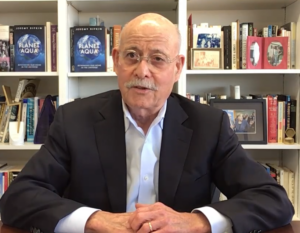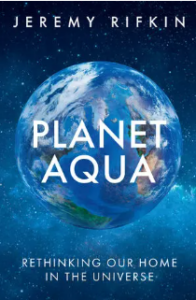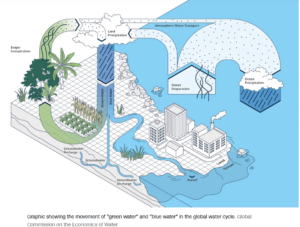“We have misunderstood the planet we live on – that misunderstanding has taken us to an extinction event in the 21st century.” Jeremy Rifkin is the big-picture man behind “The Third Industrial Revolution” in Germany and China, visionary of mega-trends like “The End of Work“. We spend an hour with Jeremy on his latest book (of 24): “Planet Aqua: Rethinking Our Home in the Universe”.
Listen to or download this Radio Ecoshock show in CD Quality (57 MB) or Lo-Fi (14 MB)

Rifkin has twin paths. He is both an economist and a long-time environmental advocate. He inspired and assisted green activism since the ’80’s. Rifkin also taught CEO’s of large corporations at the Wharton School’s Executive Education Program at the University of Pennsylvania. He is an American author with best-selling books in his country. But Rifkin’s vision and plans were implemented first overseas, in Germany and in China for example. Look for his new book “Planet Aqua: Rethinking Our Home in the Universe”.
Rifkin’s Wikipedia page is impressive. You can track his work over the years, not just through two dozen books but his follow-up activism on those books. Very few futurists consistently hit the mark, it’s a tough gig. A few of Jeremy’s works were kind of left behind when society veered off in a different direction, but not many. His early warnings on biotechnology brought criticism from the biotech industry and scientists wanting to work in that field. Some of his other books, like “The End of Work” are flowering into reality now, almost 30 years later. Jeremy Rifkin is a person in need of a biographer – or autobiography.
WHY “PLANET AQUA? 
Rifkin tells us when seen from space, this planet is Blue. Maybe “Earth”, meaning land, is not the right name. We should speak of Planet Aqua. But this is not just about the oceans, as great as they are. Rifkin means the whole realm of water in all of it’s forms: glaciers, rain, lakes, unseen vapor and all the H2O underground.
That world is in trouble. A new report finds “unprecedented stress” on the global water cycle. Johan Rockström Chair of the Global Commission on the Economics of Water told CNN: “For the first time in human history, we are pushing the global water cycle out of balance.”

Jeremy tell us:
“We don’t have a playbook for this, because the assumptions we are using to address this crisis are the assumptions that gave rise to the crisis.”
NEO-NOMADS
“A stream of new demographic studies and reports suggest that over the next 45 years one in twelve Americans will likely flee the southern half of the United States and head toward the mountain west and northwest. Millions of others will pick up their belongings from their drought ridden environments, heatwaves, and fire-sensitive south-western states and migrate to the Great Lakes region.”
– Rifkin, Planet Aqua
The first people of North America were nomads. They moved long distances with the seasons for food and water. All their possessions were portable. This is the future in climate change. Check out my interview with UK author Gaia Vince.
Jeremy says humans will have to become mobile. I have doubts about disconnecting from local spaces. Local may have resilience, community help and resources. Are we being lured into neo-nomadism, or are we getting kicked out of a sense of place?
Our recent guest Orrin Pilkey told us Americans may have to abandon the overheated South and crowd north above the 47th parallel. These scenarios are hard to imagine. Our mental machinery wants to discount it. Can humans continue to live, with a civilization, as hundreds of millions of people search for livable spaces?
Jeremy tells us for every one degree C the temperature goes up, potentially one billion people will have to move. That is not theory, he says, but backed up in scientific and technological literature. That migration is mainly from the sub-tropics and central latitudes going north.
A German Government funded agency did a study finding need for an orderly process to move climate migrants. This would begin with the Pacific island nations going underwater due to rising seas. They suggested “climate passports”. There is an example after World War I, when the great empires (like Austro-Hungary and Persian empire) collapsed. The U.S. State Dept. created new countries, but these required new documents.
The U.N. resisted developing a type of global passport. But now, as millions already try to move north into Europe and North America, Rifkin says we are going to need climate corridors and climate passports. In part, the corridors will be created by other creatures, from insect to mammals, already moving north.
Rifkin says we have always been nomadic. He points not just to history, but millions of people traveling all over the world – for tourism, business, family, whatever, masses of people are always on the move.
We need to establish ephemeral cities, with good services not refugee camps. People then move again when they need to. People in these camps govern the camp. We don’t need science fiction to imagine an ephermeral city. The book tells us about the ephemeral city of Kumbh Mela, India. It appears every 12 years on the outskirts of Allhabad. Millions come for a religious pilgrimage, as many as 50 million on one day. The instant city lasts 55 days. It has roads, electricity, running water and more. Then it is torn down and stored for another 12 years.
WE ARE ADAPTED TO CLIMATE CHANGE
Rifkin outlines the history of humans and earlier Hominids surviving wrenching climate change as Earth tilted delivering ice ages and then thousands of years of warming. We are adapted to climate change – but as far as we know, no previous climate shift is comparable to the present. Earth took much longer to warm naturally than mere hundreds of years, and so our species had time to adapt, moving slowly as tribes toward or away from the Poles.
THE ORGANS OF CHANGE
Rifkin believes big change can come quickly. He gives the example of the first industrial revolution in 19th century America – which happened in just 30 years. After the Civil War, with the economy in shambles, the U.S. laid out a railway system across the continent. That enabled distributing coal across the country. The communication revolution was the telegraph – all done within 30 years.
The second industrial revolution in the U.S. emerged in just 25 years with urban areas starting in 1900. The telephone connected people instantly. Then electricity lines across urban areas appeared. Production of millions of automobiles followed. Humans can rearrange in three decades or less.
Rifkin finds lasting change includes four concurrent revolutions: 1. new communications 2. new energy regime 3. new modes of mobility 4. (the big one) new ways to steward the waters of the planet. All species, to the smallest, need these four functions.
He explains governments do not define infrastructure. The kinds of infrastructure may determine the kinds of governments that are possible.
WE DO NOT TAME THE WATER
Humans have been trying for 6,000 years to adapt the hydrosphere to us. Now that has to be reversed, so we adapt to the changing hydrosphere. We have no choice, because Rifkins says “the hydrosphere is rewilding”. I think of the dams destroyed in Pakistan and India due to sudden glacial meltwater release in recent years. This is just part of the hydrosphere rewilding as the planet heats. Extreme rainfall events, sudden desert lakes, and flooded cities are another.
In 1995, Rifkin startled people with a vision of robotics and digitality in his book “The End of Work”. That concern is cresting now thirty years later – with a sudden arrival of artificial intelligence and robots close to human performance and beyond. As far as I know Jeremy has not spoken much publicly about artificial intelligence as a major economic or environmental force. Maybe that’s another book.
This latest book seems darker than than his earlier visions for transformation. For example, in Planet Aqua he suggests billions of people will die, and billions more will be displaced into shanty towns and tent cities. There is a tone of acceptance. Jeremy disputes “acceptance” but claims rather a clearer vision of the future.
He plans one more book in the series. The first one was “The Age of Resilience”, the second is “Planet Aqua”. Now he is working on the last in that series about “how we begin to think about intelligence” What is intelligence when we realize there are no objects or structures, but everything on this planet is in constant movement, at every moment. This includes things that look solid and still – like the mountains. Alex adds: atomically, mountains are ridges of frozen energy with atoms always in movement.
We begin to think of this planet as animated, moving and living all the time. He comes to a sense of awe.
WE CAN’T ALWAYS SEE THE WAY OUT
How can we carry small hopes along through the craters of climate disasters and growing sense of failure. Jeremy Rifkin does. We all do. An insight from this new interview: it is not necessary to see a full path out. In our history, an invention or a change of infrastructure stimulated unexpected changes. When Alexander Graham Bell invented the telephone, it was not for humans to talk. He tried to sell the technology as a way of piping live musical performances. Telephones are still revolutionizing communications, business and media extending across the globe.
Rifkin suggests there are visible smart first steps we can take. Some involve adopting new technology, others social changes. Those may enable further steps we currently do not see. So we start. That is a hope.
He is guardedly hopeful, but does not know if we will make it. Fifty years ago when he began environmental awareness and activism, Jeremy did not imagine that waters would receive rights. Now some countries and places are giving rights to rivers and there is some international effort to provide rights to parts of the sea. Water is getting rights in places in Australia, New Zealand and South America he tells us. Alex thinks: America gave corporations rights like people – now it is time to extend those to animals, plants, and waters.
Rifkin says legal documents and education need to retire “Earth” and introduce “Planet Aqua”.
Jeremy Rifkin founded and operates from the Foundation on Economic Trends. Find Jeremy directly at foet.org.
KEEP ME GOING!
My special thanks to the small but sturdy group of listeners who keep this service free with their monthly donations. That’s how it goes. I put in my forty hours a week of brain-bending, learning and angst, you pay the bills especially for advertising-free downloads for people all over the world. Join me if you can, here.
Thank you for listening, and caring about our world.
Alex
Dear Alex,
Rifkin’s kumbaya wishful thinking, in which national boundaries are replaced by eco-region consciousness because we live on a borderless aquaplanet, will not happen. He did some work for Chuck Schumer, with which Schumer will adorn himself with greenwash self promotion. Schumer is a sociopath promoting the genocide of Palestinians by settler colonial Apartheid Zionists, as is empirically true for all US federal politicians. So much for kumbaya live and let live handholding. Next step under Trump is to bomb Iran then go to war with China which will escalate to nuclear war.
More important than anything else is to prevent nuclear war which can render humanity extinct far quicker than global heating.
I gave up on the Establishment ever doing anything substantial to reduce carbon emissions after years of educational meetings between doctors and scientists and attempting to lobby state government.
The key problem is the huge individual ecofootprints of people in industrial societies, hence the key to mitigating future ecocollapse is to drastically reduce individual and hence collective ecofootprints: reduce consumption and waste production drastically.
I have since moved to an offgrid situation and have reduced my footprint by at least 90% quite easily without much sacrifice, but it did require lifestyle modification. Huge bonuses included resilience against disasters (storms that took down the power grid had no effect on me) and massive reduction in living costs. Next step is to grow food. Anyone who is able and willing must do the same, the rest will die when the system collapses.
This was a difficult listening experience. Rifkin’s passport concept seems so bogus in a world that is primarily motivated by fear. And fear is rational if everyone wants to hold on to all they have and get increasing security of future distributions for all time. This guy is a very good writer but has gone off the deep end.
We continue to dream of an infinite world. Where will the huge amounts of energy and raw materials come from to build this wonderful new world that Mr. Rifkin proclaims to us?
This is all salient but our extinction is more likely than the agreements his concept would require. Even our bible is a lie in the idea that we are ‘good Shepards’, those who pretend that are the worst bigots and racists. Not likely to survive.
I agree with the other commenters. Rifken seems to imagine that people collectively are scientists and have actual agency to accomplish such wildly specific and purposeful objectives. His comparisons to the past do not hold up as the world is so many times more complicated and people have such different experiences and agendas and options etc. etc. etc. I really hate to use the word, but he frankly sounded delusional. It isn’t that the ideas were necessarily impossible or dumb, but in my opinion are in no way whatsoever realistic given the vast multitude of cascading crises! Humanity has caused so many varieties of chaos to the planet that even if an authoritarian world government managed to put his plans into reality, the odds of success still seem extremely remote.
That interview was just downright weird.
Keep up the good work though.
He didn’t mention over consumption & over population. These are fundamentals in a sustainable existence